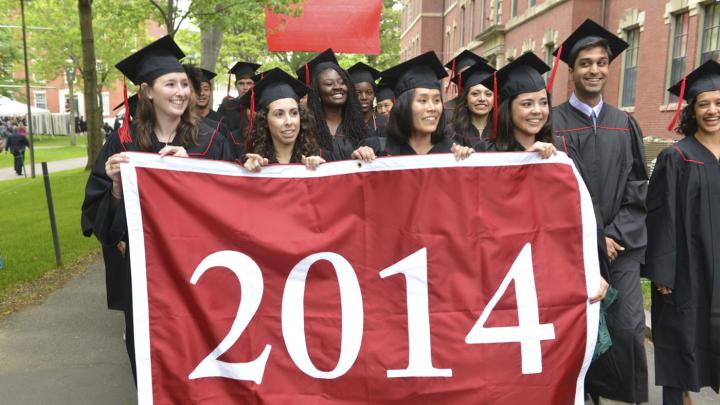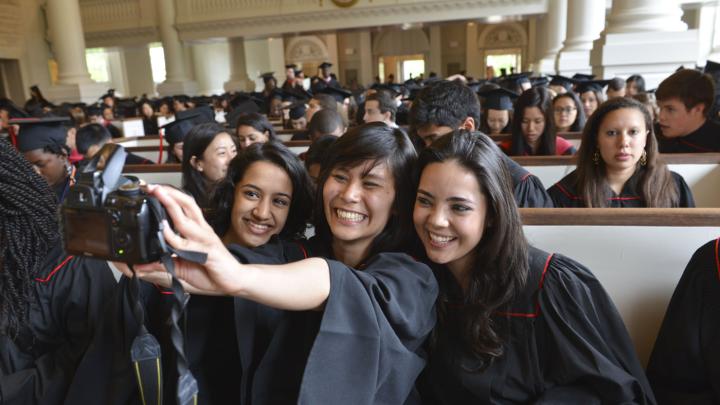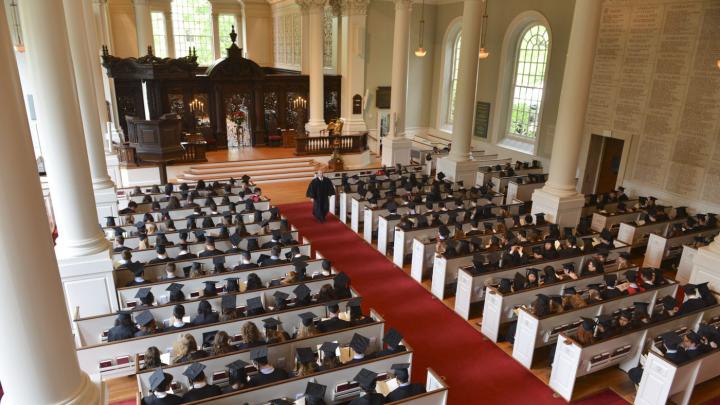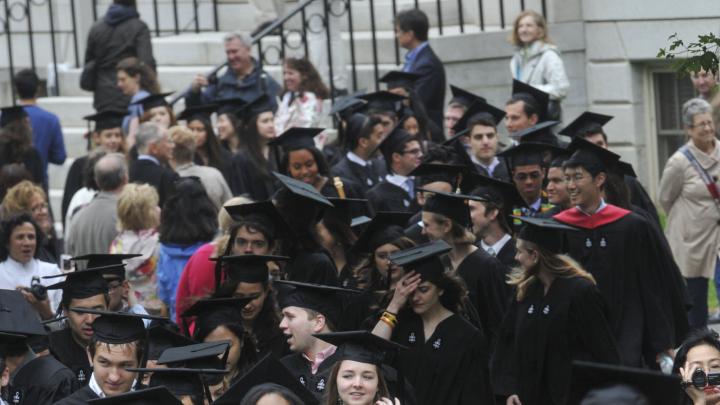“These past four years,” President Drew Faust told the graduating class of 2014 in her May 27 Baccalaureate address, have—in addition to teaching students about themselves—“also been designed to teach you about facing outward: acting for the sake of a better human community.”
In a freshman-spring survey, 90 percent of the class ranked hard work, honesty, respect, and compassion as among their top four personal values, “with power and wealth near the bottom,” Faust said. “As one of you put it, you became your best selves with each other, and you urged all of us to do the same.”
The president touched on the major events the seniors had experienced, their acts of compassion, the celebrities they had met, their embrace of new technologies, and even their divestment activism (which has dogged her this spring, and led to the arrest of an undergraduate); but her message, for all its references to current events, was about morality. “You called for a moral as well as an intellectual education,” she told the class. She then drew on popular culture—the television show, Breaking Bad—to provide just that.
The show, of which she is a self-confessed fan, is “fundamentally a morality play, chronicling the descent into evil of its main character, Walter White,” Faust explained. When the show’s creator, Vince Gilligan, came to Harvard this spring, she asked what had inspired him to dream up the mild-seeming chemistry teacher who, upon learning that he has terminal cancer, transforms himself into a “diabolical, meth-making drug kingpin.” Gilligan responded that the illness lets the character shed all the fears that have inhibited him, allowing him to ask himself what he would do if he weren’t afraid. “It is a question well worth pondering,” Faust told the class.
“Go to where you want to be,” she said; take risks. She noted the irony that they had been doing the very things she had exhorted them to do these past four years, but equally, she saw that White, the fictional meth dealer, had done the same. “He takes risks. He is an innovator, an entrepreneur, he commits himself. He develops confidence and conviction. He experiences life more fully, and yet, the more he does these things, the more selfish, the more cruel and depraved, he becomes. He rationalizes his behavior, he lies to himself and others. And he becomes a moral failure. So what have I been encouraging?” Faust asked, to laughter from the class.
The key to White’s moral demise, Faust argued, is that his motivations were selfish. “As you take that capacity for risk beyond the library and the lab and out into the world,’ she asked, “what happens to your moral compass? How do you end up ‘breaking good’?” The key, she said, is to “reach beyond what you do for yourselves to what you do for one another.’
“In a lecture here last month,” she recalled, “the former archbishop of Canterbury, Rowan Williams, suggested that empathy is not saying, ‘I understand how you feel’; rather, empathy is the capacity to say, ‘I have no idea how you feel.’ A moment of humility, of curiosity, of awe—the knowledge that we must, in his words, go on learning and relearning who others are. And who we are and what we actually care about. That is exactly what a liberal-arts education has prepared you for, for opening yourselves to that kind of learning, reaching for that kind of connecting.
“The most important thing for you to have learned here at Harvard,” she continued, “is that, far from ending with your degrees on Thursday, your education—and the service to others that is its greatest purpose—has only begun. In the words of John Cotton, a seventeenth-century founder of Harvard College, one's life work is a calling aiming at the public good: work found not by deceit and undermining of others, but through an open door. And so, class of 2014, with the right combination of luck and learning, humility and compassion, we do not break bad. Instead, we can create moments of grace, with and for one another.” In closing, she wished that they might all “have lives as good as they are great.”
Jonathan L. Walton, Plummer professor of Christian morals and Pusey minister in the Memorial Church, conducts the baccalaureate service. The ceremony has been a Harvard tradition since the seventeenth century, but now includes readings from the Analects of Confucius, the Hebrew Bible, the Hindu scriptures, the Holy Quran, the New Testament, and the Sikh Sacred Text, as well as the singing of Psalm 78 to the tune “St. Martin’s,” a tradition since at least 1806.











